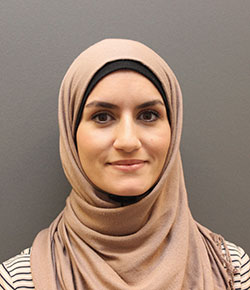Most likely, you have never heard of her. But Nawal Al-Eid, an Associate Professor, preacher, and organizational leader, is Saudi Arabia's most popular woman on social media. She has more than four million followers on Twitter, and that figure is growing.
Nawal Al-Eid is one of several conservative Muslim preachers in Saudi Arabia. The preachers are women, but their views on women and society diverge sharply from general Western views. They support an absolute monarchy, want to retain gender segregation in schools and workplaces, and when leaving the house they are so fully covered that you cannot see the shape of their shoulders.
They nevertheless have hordes of fans, both young and old and both male and female. Why these women are so popular is the big research question doctoral student Laila Makboul is investigating. This curiosity led her to Saudi Arabia’s capital of Riyadh, where she lived for one year.

(Photo: UiO)
Sees the West as a threat
In Riyadh, Makboul found that many Saudi women fight for more rights without opposing the traditional gender roles in the country.
“Many highly educated women want to retain traditional gender roles, while at the same time having very active lifestyles outside the home. They perceive the secular and liberal feminism in Western countries as a threat to their lifestyle, as they think it undermines the value of the nuclear family in society”, she says.
The gender segregation in the country is very strict. However, in recent years the number of women in the labour force has increased, though they still only make up 20 percent of the labour force. Today, over half of students in higher education are women.
Highly polarised
“In Saudi society, it is not uncommon to see the West as a threat. However, opinions are split. In Saudi Arabia we see a strong polarisation of the population, just like in many Western countries”, Makboul notes.
“Many conservative Saudis are skeptical to both the West and to more liberal Saudis. There are sharp personal attacks in Saudi public debates and a growing polarisation. This is destructive and contributes to further polarisation”, says Makboul.
When a group of liberal Saudi women in 2011 protested the prohibition on Saudi women driving, they received the support of the US Secretary of State at the time, Hillary Clinton. Makboul suspects that this support may have negatively impacted the outcome.
“Many of the women I research see this as another Western attempt to change Saudi society. The conservative women I spoke with generally don’t object to women driving, but once they associated this with the USA it became more difficult to accept. Then it became something forced on them by outsiders, which was again interpreted as an attempt to liberalise the society.”
Conservative, religious and fashionable
In addition to being a preacher, Nawal Al-Eid is an Associate Professor at the women’s univeristy in Riyadh (PNU). She is also a member of the national centre for dialogue, has her own organisation is active on Twitter, Snapchat and Instagram, and has her own app.
She organises a number of events: male audience members can listen to the lectures being streamed online, while women fight for front-row seats in the lecture hall. There, Nawal Al-Eid takes her headcovering off, and addresses the audience as a young, glamorous and charismatic woman.
Expands her space
Both Al-Eid and other women preachers are examples of traditional women being active in the society. For these women, religion helps open up space: it provides them with a platform to meet others and participate in public debates.
“They participate within current norms and rules in Saudi society. By acting within socially conservative values, they expand the space available to them”, says Makboul.
“For instance, in wishing to retain traditional gender roles, they argue that women would lose out if they had to fight for the same jobs as men. Many, but not all, accept that argument. It is important to emphasise that these women fight to participate on their own terms”, Makboul notes.
“For liberal Saudi women, their views seem to restrict the space available to women. Not least, this is true of the preachers’ opposition to repealing the guardianship system that require women to have the consent of a man to travel or marry, among other things.”
Did not get full access
Laila Makboul is herself Muslim, with a Norwegian and Moroccan background. When she travelled to Riyadh in the autumn of 2015, she thought her Muslim background would make it easier for her to access Saudi Arabia’s conservative communities. She was wrong.
“I encountered a basic skepticism. For example, one female preacher asked if the information I collected would be used by the Norwegian secret service. I also think they struggled to know what to make of me, as I was both Western and Muslim.”
During the year she was there, she did not get as many interviews as she had hoped. However, she participated in several public events in mosques and other places of learning, and in these places she got the same access as any other participant.
Label each other
Laila Makboul has also experienced prejudices in Norway. On a few occasions she has written letters to the editors in which she has tried to paint a more nuanced picture of Saudi Arabia in the Norwegian media. These have been met with accusations that she is a Muslim extremist, and she has also been told that she “tries to make the dictatorship look good”.
“Instead of listening to what people have to say, we are very quick to label each other. The labels determine whether we criticise or support someone else’s views”, says Makboul.
